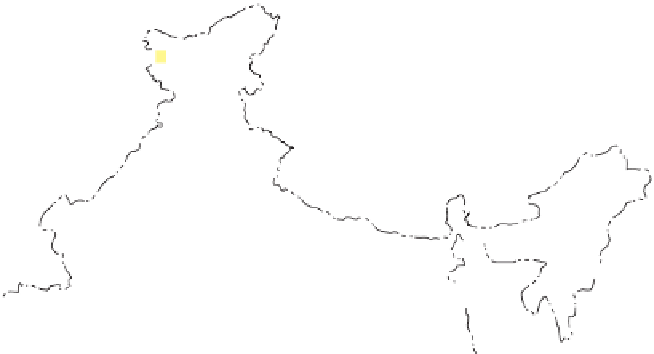Geography Reference
In-Depth Information
Figure 6.17
Language Families of India.
Regional
classifi cation of Indian Language Families.
India's states generally coincide with a major
language family or language.
Adapted with
permission from
: Hammond, Inc., 1977.
English and Swahili are offi cial languages of Tanzania.
In Mauritania, French and Arabic are offi cial languages.
But this solution was not always enough. When India
gave Hindi offi cial status, riots and disorder broke out
in non-Hindi areas of the country. Kenya, which at fi rst
made English and Swahili its offi cial languages, decided
to drop English in the face of public opposition to rules
requiring candidates for public offi ce to pass a test of
their ability to use English.
The offi cial languages in a country are a refl ec-
tion of the country's history. In Peru, Spanish and the
Amerindian language Quechuan have offi cial status
and are found in distinct regions. In the Philippines,
English (spoken primarily in Manila) and a creolized
Spanish called Pilipino are both offi cial languages.
Tiny Singapore, the city-state at the tip of the Malay
Peninsula, has four offi cial languages: English, Chinese,
Malay, and Tamil (an Indian tongue). India is the coun-
try with the largest number of offi cial languages—22 if
we include both offi cial languages listed in the country's
constitution and offi cial languages proclaimed by States
within India.
The European Union is not a country, but it rec-
ognizes 23 offi cial languages, and the United Nations
has 6 offi cial languages. In each of these cases, the
international organization offers simultaneous transla-
tion among the offi cial languages to any member of the
parliament (European Union) or the general assembly
(United Nations) who requests it. Each international
organization also publishes paper documents and main-
tains its website in all offi cial languages.
Global Language
What will the global language map look like 50 years from
now? More and more people are using English in a vari-
ety of contexts. English is now the standard language of
international business and travel (the lingua franca), much
of contemporary popular culture bears the imprint of
English, and the computer and telecommunications rev-
olution relies heavily on the use of English terminology.
Does this mean that English is on its way to becoming a
global language?


















































































































































































































